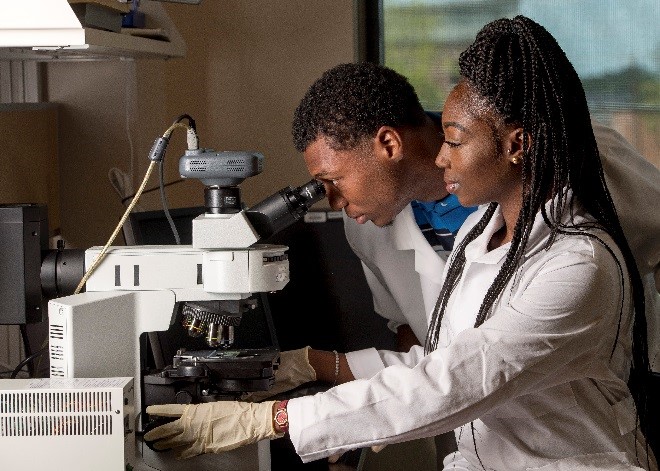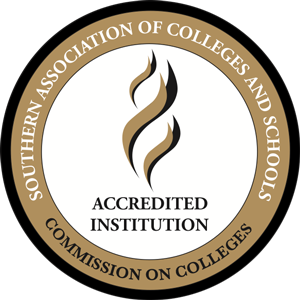Welcome to Biomedical Engineering
CREATE, STRENGTHEN, SOLVE
About BME
Biomedical engineers utilize the principles of engineering and biology to solve problems and develop systems, devices and products that can be used to improve our quality of life. As a biomedical engineer, you could be involved in designing the latest artificial organs and joints, creating devices to detect and treat disease, or developing synthetic skin and bone grafts. Biomedical engineering (BME) is one of the fastest growing engineering disciplines – with very promising job prospects. Biomedical engineers typically work in the industry, academia, research facilities or government agencies.
Potential Employment and Research Opportunities include:
- Tissue regenerations
- Biocompatible implants and prostheses
- Diagnose devices
- Therapeutic devices
- Imaging
- Drug delivery
 |
 |
 |
Mission
The mission of the Bachelor of Science in Biomedical Engineering (BSBME) program is to produce graduates of superior technical, professional, and scientific backgrounds in biomedical engineering who can perform effectively and embrace education as a lifelong endeavor.
Vision
The Biomedical Engineering program seeks to graduate students who are prepared to pursue meaningful careers and make significant contributions to the biomedical field.
Our Staff
Our Staff
 |
Dr. Derrick Dean, Director Professor of Biomedical Engineering Email: ddean@alasu.edu Phone: 334-604-9314 |
 |
Dr. Manu Sebastian Mannoor Associate Professor of Biomedical Engineering Email: msmannoor@alasu.edu Phone: 334-604-8424 |
 |
Dr. Vineeth Vijayan
Assistant Professor of Biomedical Engineering
Phone: 334-604-9136
|
 |
Ms. Marilyn Thornton Program Specialist Email: mthornton@alasu.edu Phone: 334-604-9152 |
Two ASU Professors Join COVID-19 Fight
 Dr. Derrick Dean, professor and coordinator of ASU's,Biomedical Engineering, works
on his 3D printer to make medical face shields. Photo by ASU photographer David Campbell
Dr. Derrick Dean, professor and coordinator of ASU's,Biomedical Engineering, works
on his 3D printer to make medical face shields. Photo by ASU photographer David Campbell
Click Link for Article
https://www.alasu.edu/two-asu-professors-join-covid-19-fight
ASU Hosts Robotics Competition for Middle & High School Students!

Students constructing their project's robot for the 2019 competition hosted by ASU
Outside the classroom, undergraduate gain real-world experience through research, industry internships and practical experiences. As early as the first year, students begin to explore BME research labs, and by the fourth year, they are performing cutting-edge and often publishable research work. This experiential learning will prove invaluable as students seek employment and/or graduate and professional school admission. Programs such as industry internships and co-ops will provide opportunities for students to apply their knowledge to solving real-world problems.
Potential Employment and Research Opportunities include:
· Tissue regenerations
· Biocompatible implants and prostheses
· Diagnose devices
· Therapeutic devices
· Imaging
· Drug delivery
Program Educational Objectives (PEOs)
The educational objectives of the BME Undergraduate Program are for our graduates to be functioning professionals who have:
- Gained admission to graduate or professional school, or gained employment in engineering and/or health-related professions.
- Pursued opportunities for professional growth, development, and service.
Student Outcomes:
Outcome 1. an ability to identify, formulate, and solve complex BME problems by applying principles of engineering, science, and mathematics
Outcome 2. an ability to apply engineering design to produce solutions that meet specified needs with consideration of public health, safety, and welfare, as well as global, cultural, social, environmental, and economic factors
Outcome 3. an ability to communicate effectively with a range of audiences
Outcome 4. an ability to recognize ethical and professional responsibilities in engineering situations and make informed judgements, which must consider the impact of engineering solutions in global, economic, environmental, and societal contexts
Outcome 5. an ability to function effectively on a team whose members together provide leadership, create a collaborative and inclusive environment, establish goals, plan tasks, and meet objectives
Outcome 6. an ability to develop and conduct appropriate experimentation, analyze and interpret data, and use engineering judgement to draw conclusions
Outcome 7. an ability to acquire and apply new knowledge as needed, using appropriate learning strategies
Student Enrollment
|
|
2015-16 |
2016-17 |
2017-18 |
2018-19 |
2019-20 |
2020-21 |
2021-22 |
5-year average |
|
New Enrollments |
0 |
5 |
19 |
19 |
24 |
24 |
19 |
21 |
|
Current Enrollment |
0 |
5 |
31 |
45 |
54 |
64 |
60 |
50.8 |
Student Degrees Awarded
|
Graduation Year |
2016-17 |
2017-18 |
2018-19 |
2019-20 |
2020-21 |
2021-22 |
|
Number of Graduates |
n/a |
n/a |
1 |
3 |
8 |
4 |
RESEARCH INFRASTRUCTURE
The Biomedical Engineering Program at Alabama State University is equipped with state-of-the-art characterization methods to perform high-quality biomedical research. Some of the important facilities available to the department are as follows.
3D PRINTING FACILITIES
The BME Program is equipped with many different sophisticated 3D printers which can be utilized for 3D printing and 3D bioprinting. This gives the opportunity for students to be trained in the advanced area of additive manufacturing.
CORNING MATRIBOT BIOPRINTER CREATOR MAX 3D PRINTER MAKERBOT METHOD 3D PRINTER
ENVISION TECH BIOPLOTTER MAKER BOT REPLICATOR DREMEL DIGILAB 3D PRINTER
(A HIGHLY ADVANCED 3D BIOPRINTER)
FACILITIES FOR ENGINEERING NEW MATERIALS
The BME program offers the most advanced state-of-the-art facilities and instrumentation for material engineering and its characterization. This gives the opportunity for students to be trained in material engineering and characterization methods. Some of the major facilities available to the department are listed below
PHENOM XL BENCH TOP SCANNING TA INSTRUMENTS TGA 5500 TA INSTRUMENTS DISCOVERY SERIES RHEOMETER
ELECTRON MICROSCOPE
TA INSTRUMENTS DISCOVERY MTS CRITERION MODEL 42 MECHANICAL THERMOSCIENTIFIC HAAKE MINICTW MICRO-CONICAL
SERIES DMA 850 TESTING SYSTEM TWIN SCREW COMPOUNDER
THERMOSCIENTIFIC HAAKE MINIJET II HARRICK PLASMA CHAMBER PDC-001-HP HEIDOLPH ROTATORY EVAPORATOR
PISTON INJECTION MOULDING MACHINE SURFACE MODIFICATION DEVICE
FACILITIES FOR BIOLOGICAL TESTING OF MATERIALS
The BME program offers the most advanced state-of-the-art facilities and instruments for biological characterization of engineered biomaterials. This gives the opportunity for students to be trained in the different biological testing of biomaterials such as cell viability, cell adhesion, and cell differentiation assays. Some of the major biological testing facilities available to the department are listed below.
BIOSAFETY CABINETS THERMOSCIENTIFIC ISOTEMP CRYOGENIC THERMOSCIENTIFIC REVCO ULTRA-LOW FREEZER
FREEZER
BOKEL CO2 INCUBATOR BECKMAN COULTER ULTRACENTRIFUGE BIOTEK CYTATION 3 CELL IMAGING MULTIMODE READER
(An ADVANCED IMAGING SYSTEM FOR CELLS)

